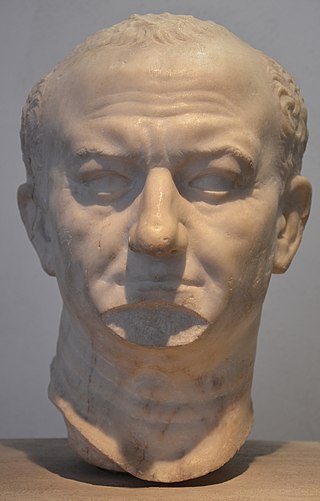Related Research Articles

The Historia Augusta is a late Roman collection of biographies, written in Latin, of the Roman emperors, their junior colleagues, designated heirs and usurpers from 117 to 284. Supposedly modeled on the similar work of Suetonius, The Twelve Caesars, it presents itself as a compilation of works by six different authors, written during the reigns of Diocletian and Constantine I and addressed to those emperors or other important personages in Ancient Rome. The collection, as extant, comprises thirty biographies, most of which contain the life of a single emperor, but some include a group of two or more, grouped together merely because these emperors were either similar or contemporaneous.

The gens Flavia was a plebeian family at ancient Rome. Its members are first mentioned during the last three centuries of the Republic. The first of the Flavii to achieve prominence was Marcus Flavius, tribune of the plebs in 327 and 323 BC; however, no Flavius attained the consulship until Gaius Flavius Fimbria in 104 BC. The gens became illustrious during the first century AD, when the family of the Flavii Sabini claimed the imperial dignity.
Cornelius Repentinus was a Roman Senator who was active in the 2nd century AD. He held a number of positions during the reigns of emperors Marcus Aurelius, Commodus and Didius Julianus, which included suffect consul and Urban prefect of Rome.
Sextus Cocceius Anicius Faustus Paulinus was a Roman senator who was appointed suffect consul sometime before AD 260/268.
Lucius Caesonius Ovinius Manlius Rufinianus Bassus was a Roman military officer and senator who was appointed suffect consul twice, in around AD 260 and 284.
Valerius Maximus was a Roman senator.

The gens Postumia was a noble patrician family at ancient Rome. Throughout the history of the Republic, the Postumii frequently occupied the chief magistracies of the Roman state, beginning with Publius Postumius Tubertus, consul in 505 BC, the fifth year of the Republic. Although like much of the old Roman aristocracy, the Postumii faded for a time into obscurity under the Empire, individuals bearing the name of Postumius again filled a number of important offices from the second century AD to the end of the Western Empire.
Flavius Antiochianus was a prominent Roman politician during the reigns of the emperors Gallienus, Claudius Gothicus, Quintillus and Aurelian, in the period referred to as the Crisis of the Third Century in the Roman Empire.
The gens Ceionia or gens Caeionia or the Caeionii family was an ancient Roman senatorial family of imperial times. The first member of the gens to obtain the consulship was Lucius Ceionius Commodus in AD 78. The rise of this family culminated in the elevation of the emperor Lucius Verus, born Lucius Ceionius Commodus, in AD 161.
Gaius Domitius Dexter was a Roman senator who was appointed consul twice: firstly as suffect consul prior to AD 183, and secondly as ordinary consul in AD 196 with Lucius Valerius Messalla Thrasea Priscus as his colleague.
Titus Flavius Claudius Sulpicianus was a Roman statesman who served as Senator and Consul suffectus. He unsuccessfully attempted to succeed his son-in-law Pertinax as Emperor in 193.
(Titus Flavius) Postumius Quietus was a Roman senator who was appointed consul in AD 272.
Postumius Suagrus or Suagrius was a Roman senator.
Titus Flavius Postumius Titianus was a Roman statesman who served as senator and consul suffectus.
Marcus Nummius Albinus was a Roman senator who was appointed consul twice, first as a suffectus sometime around AD 240, and secondly as an ordinarius in AD 263.
Lucius Hedius Rufus Lollianus Avitus was a Roman senator and military officer. He was consul in the year 144 as the colleague of Titus Statilius Maximus.
Lucius Virius Lupus Iulianus was a Roman military officer and senator who served as consul ordinarius in 232 alongside Lucius Marius Maximus.
References
- ↑ Birley, The Fasti of Roman Britain (Oxford: Clarendon Press, 1981), p. 267
- ↑ Brewer, Richard J. Birthday of the Eagle: The Second Augustan Legion and the Roman Military Machine (2002), p. 116
- ↑ Mennen, p. 121
- ↑ Watson, Alaric, Aurelian and the Third Century (1999), p. 165
- ↑ Martindale & Jones, p. 947